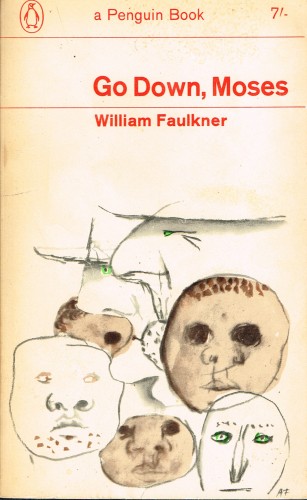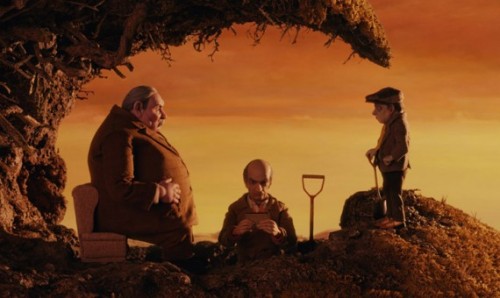
One advantage of the Internet is providing a certain type of community for people in places where there’s little of it, and in that spirit we’re starting a Mockingbird reading group (no law!), which will really just be planned serial blog posts with commentary encouraged. The book will be Go Down, Moses, a favorite among Faulkner’s works, and one with a fair amount of thematic consonance with what’s going on at Mbird. The novel itself is a series of interweaving and cumulative short stories, with a novella about a bear taking up most of its second half. The critical approach will be naïve. At best the series will be a book discussion with a post for each chapter, at worst it’ll be a collection of blog posts on only the first few of the novel’s stories. Anyway, thoughts on the first chapter, “Was”, are below, and the book’s available to order here.
 The book tells the story primarily of the McCaslin family, starting in the late 1700s (likely the land’s original American proprietor) and continuing into childless Isaac ‘Ike’ McCaslin’s old age, where the novel begins. After establishing Ike as “uncle to half a county and father to no one”, already anticipating the tale of his family’s mixed black-white branch. Faulkner then flashes back to a memory of Ike’s elder cousin, McCaslin Edmonds, of a time he accompanied his uncle Buck to bring back an escaped slave.
The book tells the story primarily of the McCaslin family, starting in the late 1700s (likely the land’s original American proprietor) and continuing into childless Isaac ‘Ike’ McCaslin’s old age, where the novel begins. After establishing Ike as “uncle to half a county and father to no one”, already anticipating the tale of his family’s mixed black-white branch. Faulkner then flashes back to a memory of Ike’s elder cousin, McCaslin Edmonds, of a time he accompanied his uncle Buck to bring back an escaped slave.
The story takes place in 1859, just before the War, a time for which Southern writers lesser than Faulkner may have expressed nostalgia. In Faulkner’s 1859, although aristocratic Southern society has yet to unravel, its fabric is fraying at the edges. A fascination with those edges, with the liminal, has often characterized the best Southern literature: O’Connor, for instance, uses “freaks” and the grotesque to heighten her examination of fallen human nature. To the deaf you shout, she avowed in one essay, and to the nearly-blind you make wild and exaggerated gestures – hence a murdered grandmother, a Bible salesman turned sexual abuser, or a woman gored by a bull. Faulkner tends to rely less on implausible situations, not so much shouting as attuning readers’ ears to the minute gestures with undertones humorous, ominous, or shocking.
By way of summary, a McCaslin slave runs for a neighboring plantation, where he plans to see Tennie, a slave of the Beauchamp family. A nine-year-old McCaslin Edmonds, ‘Cass’ for short, accompanies his impetuous and single Uncle Buck to try to run him down before he reaches the Beauchamps’, while his Uncle Buddy, also a bachelor, stays home but counsels him to look after Buck. (The uncles’ full names are Theophilus and Amodeus, respectively Greek and Latin for ‘lover of God’.) Hubert Beauchamp has a sister, Sophonsiba, who’s tried to seduce Buck before. Sophonsiba wants a husband, her brother wants to find her one, and both McCaslins want to stay single: Sophonsiba has tried to force Buck’s hand before, but his canny brother always interferes.
After Buck and Cass arrive, Hubert asks him to take a drink on the porch before chasing down his slave, and Buck obliges. Several drinks and midday dinner later, and we realize Buck is the real quarry, lured to “bear-country” by his slave. Turns out, the slave (“Tomey’s Turl”) has gotten Tennie to cut a deal: he lures Buck to Warwick (pretentious and unfounded name of the Beauchamps’ farm) for Sophonsiba, and her husband will arrange for he or Tennie to be sold so they can be together. After tracking Turl unsuccessfully all night (and all but emptying a liquor bottle in the process), Buck finally lays down in an unused bedroom. Sophonsiba screams, and Buck has been caught: for his and Sophonsiba’s honor, he’ll be forced to marry her.
The story plays out like a comedy: two uncles, one shrewd and the other bumbling; a secret plot by two lovers to be together and play matchmakers in the process; the dramatic irony as we watch Buck stumble unknowingly into the trap; a fox wreaking havoc in the big house by drawing the dogs at full-speed after it. The whole scenario is laugh-out-loud funny at times, but challenging at others, and no matter how much it might’ve read to its original audience like a plantation comedy, Faulkner’s also calling our attention to the more disturbing elements.
For instance: the name Tomey’s Turl, by implication without father and without last name, already implies his ‘miscegenation’ by the elder McCaslin and his slave, as well as (more germane) the family’s refusal to acknowledge him. Every time Buck and Buddy speak of him, they disavow him, dispossess him, and repudiate their (half-) fraternity with him. “Tomey’s” Turl – we don’t need to speak of a father. And it fits too with neither Buck nor Buddy having had children: they want the benefits of their legacy, the house and land and wealth, without the cost which children would bring. The hunt’s incursion into the home (the fox) serves as comedic foreshadowing to the marriage hunt at Warwick, but also it suggests an intrusion of the wild into domestic life.
And, of course, there’s the problem of slavery, but in this story it is drawn up into the themes of hunting and gaming. Cass consistently uses hunt language to describe his uncle’s chase of Turl, calling it “the best race he had ever seen.” Humans are being de-humanized: Turl has become a rabbit or fox, Buck is compared to a bee (pollination/sex/marriage) and a hornet (anger at Turl). Both Beauchamp and Buck are fighting to maintain their “peace and quiet and freedom”, defined as life without a woman to care for.
So gender issues appear too, as Miss Sophonsiba is viewed as a problem to be avoided. Both Buck’s and Hubert Beauchamp’s refusal to have a family should be a sign that all isn’t well. Since Faulkner, well-developed frameworks for gender and racial equality have helped bring these issues to light, but unfortunately many critics would stop there, make these themes into absolutes. They remain, however, symbols, and the dowry question points to how the gender theme, in particular, works.
When Buddy comes to rescue his brother (who sent Cass through the window as a messenger), Hubert agrees to bet him his sister’s dowry (land and slaves) against his brother’s freedom from marriage. In the traditional definition of a dowry, it’s the female child’s share of the family inheritance. So when her brother, custodian of the family wealth, gambles her dowry in cards, it’s not just Buck he’d be taking money from; he’d effectively be disinheriting his sister. The hunt is replaced by the game; they will speculate on family members white and black. Buddy, a renowned poker player, wins the game. Whether by skill or luck doesn’t matter much to the story; Hubert at least has the grace to know he’s been beaten and retire.
Buck’s and Buddy’s brother, Tennie’s Turl, manages to secure a marriage to Tennie through his own cunning, since his brothers wouldn’t plan one for him. Buck gets to return to his single life of drinking and hunting without encumbrance, and Buddy gets to keep his companion.
True to comedic form, the story ends where it began, with dogs chasing the fox, who has again broken loose from its cage, around the house. The catastrophe has been averted; Buck gets to keep his prized freedom, and a marriage between the united lovers, Turl and Tennie, approaches. But although the chase between fox and dogs and two hapless uncles continues, it still hints at a certain restlessness which has entered domestic life. We assume Hubert still wants free of his sister, and as everyone pursue their agendas, the ritual hunt looks more and more like a sort of game, gambling sisters and brothers and inheritances like property, nothing quite stable since people are prizing individual freedom over family, hunting and gambling and fleeing to maintain their share. Faulkner will dial in on this domestic restlessness in the next chapter, which examines the appeal of riches, and the search for them, over against the mundane peace of the home and “The Fire and the Hearth”.
Stray observations and questions:
-Hubert uses dinner to delay Buck’s hunt, buying time for Turl to run and Sophonsiba to plot. Manners have become a tool to snare Buck, and the tension between ‘pure’ aesthetic ritual, and ritual tainted by acquisitiveness and ambition, will persist in later stories.
-Hubert’s plan works until he tries to get an extra $500 out of Buck, and then the way is opened for Buddy to keep playing him (against his better instincts), and he ends up losing.
-Does Turl cheat for Buck? Why? Hubert notes his McCaslin blood before deciding to stop playing.
-Cass at the end notes that it was “a fine race while it lasted, but the tree was too quick.” What’s changed since the fox/dogs scene at the story’s beginning? I couldn’t make head or tail of that comment.

COMMENTS
One response to “Go Down, Moses by William Faulkner, pt 1 (“Was”)”
Leave a Reply














There is a line in a Faulkner novel (that I can’t remember), when a person says, “There’s a place where the law ends, and just people begin.” I’d be grateful for any help pinning this down.